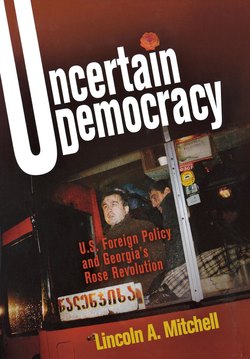Uncertain Democracy

Реклама. ООО «ЛитРес», ИНН: 7719571260.
Оглавление
Lincoln A. Mitchell. Uncertain Democracy
Отрывок из книги
Uncertain Democracy
U.S. Foreign Policy and Georgia’s Rose Revolution
.....
It was America’s first born-again Christian president, Jimmy Carter, who introduced an explicitly moral dimension to democracy promotion by stressing the import of human rights in foreign policy.12 Carter’s notion that the internal workings and human rights record of a country should influence American policy toward that country was initially scoffed at by many who felt that during the Cold War the only consideration was how a government aligned itself between the two superpowers.13 However, as we will see later, it was the neoconservatives during the presidency of George W. Bush who, ironically, revived this morally driven view in their strong support of democracy promotion—even in some countries which were U.S. allies but not democratic.
Carter’s introduction of human rights into American foreign policy gave way to the presidency of Ronald Reagan and the prosecution of the Cold War with renewed vigor. Reagan incorporated democracy promotion into his Cold War strategy through “Project Democracy,” which included exchange programs and other cultural activities aimed at exposing people from communist countries to American-style democracy.14 These programs were, not surprisingly, focused on the ideological struggle of the Cold War and sought to contrast Reagan’s America with, for example, late and post-Brezhnev Soviet Union. The battleground of the Cold War at that time was primarily Central America, where the leftist Sandinista revolution had just occurred in Nicaragua, so much of Reagan’s democracy promotion, like his Cold War strategy in general, was focused on that region.
.....